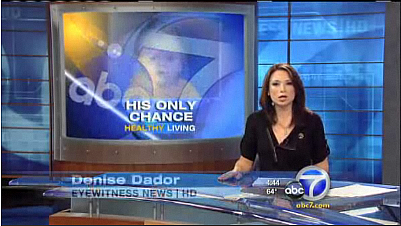KABC Health Reporter Denise Dador discusses challenges, rewards of television news

A clip has been making its way around the Internet: When David Gregory asked Tom Brokaw how he would break into the business today, he said, "I'd go to medical school."
If it is hard to make a good career in news, it's even harder to make a well-paying career in broadcast television news. Starting salaries are low and most television reporters will never make it to a top ten market. That's what KABC-TV health reporter Denise Dador told several attendees of the California Chicano News Media Association Journalism Opportunities Conference at USC today. She spoke along with KABC medical producer Julia Seifer about what students and young journalists should expect if they pursue a career in television news.
Should you specialize in health? Dador said that even if you are a general assignment reporter, "any market -- small, medium, or large -- is going to cover health stories." So even if they can't afford to dedicate one person solely to health stories, they are going to want to cover that beat.
Dador, who began her career in KMPH in Fresno, became the health reporter at the ABC affiliate in Detroit in 1993. "I really fought it, I did not want to be a health reporter," Dador said. She envisioned a broader career for herself, one where she covered the big stories and was flown around the world. But she realized that viewers responded to health reports in a way they did not respond to homicides and fires. "It's extremely rewarding, more than I thought it would be," she said. "Now I feel lucky I landed this gig."
Seifer, who began her career at KABC some 20 years ago by answering phones in the newsroom, suggests that if you are interested in specializing in health, start as a general assignment reporter and then carve out your niche. You can also branch out on stations' websites and social media platforms.
What does it take to be a good health reporter in television news? Seifer said that passion is essential to working up from low-paying jobs and connecting with viewers. "You can learn the medicine behind it and know which experts are going to help you tell the story," she said, "but it's the telling of the story [that is crucial]."
Seifer and Dador recall a medically complex story about a baby who had part of his brain surgically removed to control seizures. Dador had to explain the concept of brain plasticity while keeping a narrative flow.
What are some of the challenges? Dador files health stories twice a day, for the 4 p.m. and 5 p.m. news, and occasionally for the 11 p.m. and morning broadcasts. Both she and Seifer have to adapt to shifting priorities throughout the day and grapple with which health stories make the cut. Among the challenges of reporting for a local news station is keeping the stories fresh. Tonight, for example, Dador will report on a free health clinic at the Los Angeles Sports Arena. She has done many stories on free clinics -- people line up, they don't have insurance and they often do not have regular access to health care -- but Dador says she focuses on finding fresh personal stories. "I don't feel good just rehashing the same type of thing," she said. Heat waves, allergy and flu seasons, stories that chocolate is good for you or bad for you -- it is challenging stories to keep these stories fresh. But Dador says that viewers respond positively to these reports and find the information useful.
"We are not saying that you are getting everything you need to know," said Seifer. Sometimes choices are driven by the news of the day, such as new mammogram guidelines or treatment options. A report on a new back pain procedure might seem like a softball story, Seifer said, but it has a lot of resonance with viewers. Reporters and producers won't always get four minutes to do an in-depth piece on environmental health issues, and some stories just don't have the compelling visuals to work well on television.
"For what we have, we try and touch on various topics," she said. "It's a matter of the medium."
How do you get a foot in the door? New reporters, Dador said, often spend too much time on "presentation -- the hair, the clothes, the makeup," but writing and reporting stories well is most important. Internships are also crucial to getting into broadcast news.
"This business is all about who you know and networking," Dador said. "And I think it's important to see if you really want to do the job."
Read more about reporting health stories for broadcast television:
Interviewing Patients: Follow the Golden Rule
Guerrilla Health News: Andrew Schorr's profitable model for health education
